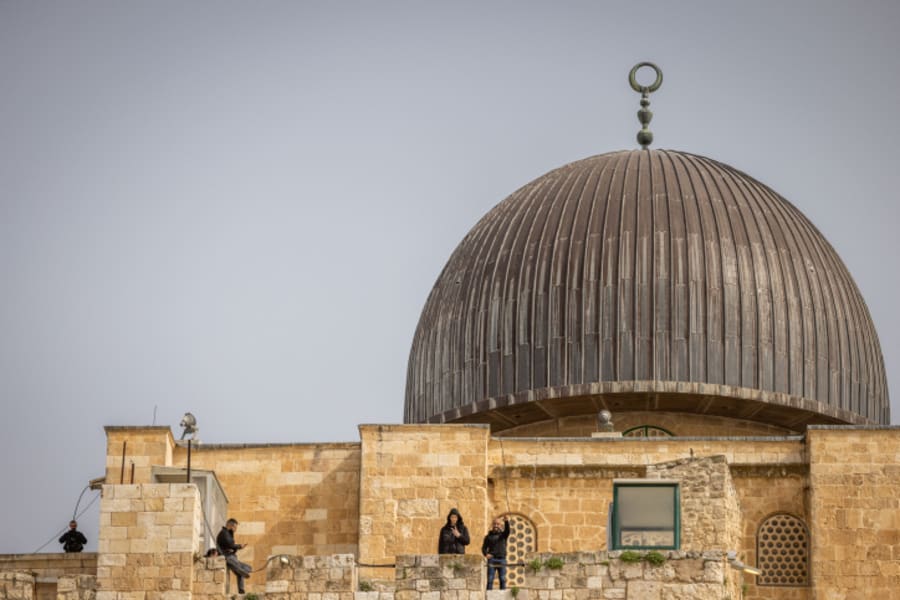THE WEEK AHEAD: Passover, Easter, Ramadan draw high alert around Jerusalem
Here are the stories we are watching...

Here are the stories we are watching...
Holy week for the world's three major monotheistic religions
Israel and Egypt launch new direct flights between Tel Aviv and Sinai
Tourists and pilgrims return to Israel
Will the coalition withstand another threat?
United States introduces resolution on UN Security Council veto
PASSOVER, EASTER, RAMADAN
In a rare concurrence that happens once every 10 years, the Jewish, Christian and Muslim religious calendars, are observing major periods of holy time this week. As the holidays of Passover, Easter and the Holy Month of Ramadan are being celebrated around the world – Jerusalem is shining at its best, but is also fearing the worst.
Tensions around the Temple Mount during this time of the year have led to major security escalations in the past. The Israeli government, Palestinian Authority, Egypt and Jordan have been making efforts in recent weeks to avert a deterioration. Israel’s security forces enhanced their presence around hotels, tourist and religious sites.
Hundreds of Jewish worshipers will perform the Priestly Blessing (Birkat HaKohanim) at the Western Wall on Monday. The mass gathering for the blessing of the entire Jewish nation is traditionally led by the descendants of the priestly tribe, wearing a huge blanket of white tallitot.
Friday is also expected to draw high security alerts, as tens of thousands of Muslims will gather at al-Aqsa Mosque. At the Church of the Holy Sepulchre, the Holy Fire ceremony will take place on the Saturday before Orthodox Easter. The Holy Fire is said to be a miracle that happens every year during this mass event. According to Orthodox tradition, a light emanates from the stone bed on which the body of Jesus was said to have been laid.
ISRAEL AND EGYPT EXPAND FLIGHTS
Israel and Egypt will launch nine additional weekly direct flights between the two countries. The new route starts operating on Sunday between Ben-Gurion International Airport and Sharm el-Sheikh. Israeli Prime Minister Naftali Bennett and Egyptian President Abdel Fattah el-Sisi discussed the possibility in September, but it is only coming to fruition now.
Sharm el-Sheikh is a city located on the southern tip of the Sinai Peninsula and is considered a desired tourist destination that appeals to young Israelis. Egypt hopes that tourists from Israel will help compensate for a sharp decline in Russian and Ukrainian tourists, who represent about 70% the city's tourists over the past five months.
TOURISTS RETURN TO ISRAEL
The Israeli Ministry of Tourism estimates that approximately 30,000 tourists will arrive in Israel this week for the April holidays of Passover, Easter and Ramadan. While these numbers are still far lower than the pre-pandemic era, the tourism industry is optimistic about the gradual increase after nearly two years of COVID restrictions.
Deputy general director at Israel’s Ministry of Tourism, Kobby Barda, told ALL ISRAEL NEWS that he views this week as a harbinger of good news for the industry. “We've seen nice numbers recently and we believe that the trend will only increase in the following months,” Barda said.
Bethlehem, in the West Bank, is also preparing for an influx of tourists. The city’s 47 hotels report that bookings are running at 30% during Easter season so far.
WILL COALITION SURVIVE LATEST THREAT?
The already shaky coalition – which lost one member last week stripping it of its one-vote majority – is now facing another possible exit of four more members. A leader in the Southern Islamic Movement called on the Ra'am Islamist party to withdraw from the coalition after clashes between Palestinians and police on the Temple Mount over the weekend.
Ra’am denounced Israeli security forces over the violence at the Jerusalem holy site, and one of the Islamist party’s lawmakers has threatened to quit the coalition. Ra’am chief Mansour Abbas, however, has downplayed such a prospect and issued repeated calls for calm.
“Resign immediately from the coalition that is attacking our holy sites in Palestine,” Sheikh Mohammad Salameh Hassan wrote on Facebook. “Do it for al Aqsa.”
Should Ra'am step out, resulting in a loss of four more votes, the government could collapse before it hits the one-year mark.
U.S. INTRODUCES RESOLUTION ON UN SECURITY COUNCIL VETO
The United States will formally present to members of the United Nations a resolution that mandates a General Assembly meeting whenever a veto is cast in the Security Council. The measure is co-sponsored by the U.S., Lichtenstein, Japan and other countries in an attempt to seek accountability of veto-wielding nations in the U.N. Security Council, such as Russia. Following the invasion of Ukraine, Russia used its veto power to block a motion against it.
“When a Permanent Member casts a veto, that member should be prepared to explain why the resolution at issue would not have furthered the maintenance of international peace and security. Unfortunately, not all members of the Security Council share this sentiment. We are particularly concerned by Russia’s shameful pattern of abusing its veto privilege over the past two decades,” U.S. Ambassador Linda Thomas-Greenfield said in a statement.
Some in Israel are concerned that if adopted, the resolution would further complicate the Jewish State’s standing at the UN. The U.S. has used its veto power at the Security Council multiple times to block biased anti-Israel resolutions. However, at the General Assembly, anti-Israel forces have a built-in majority.
This week we are also keeping an eye on these developing stories:
...Will Hamas and Islamic Jihad in Gaza use West Bank tensions as a catalyst for a new round of fighting with Israel?
...Will President Biden consider rejecting a new nuclear deal with Iran, in light of increasing opposition from former military generals and members of Congress?

The All Israel News Staff is a team of journalists in Israel.














